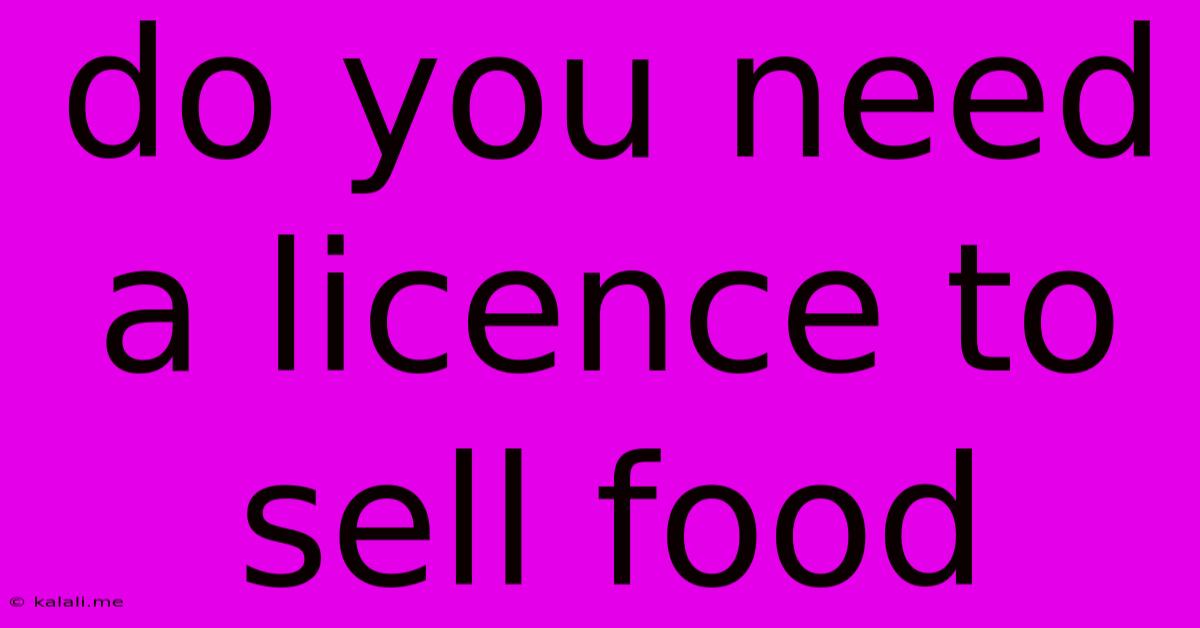Do You Need A Licence To Sell Food
Kalali
Jun 04, 2025 · 4 min read

Table of Contents
Do You Need a License to Sell Food? A Comprehensive Guide
Meta Description: Selling food? Find out if you need a license, the different types of permits involved, and how to navigate the complex food safety regulations. This comprehensive guide covers everything from home-based businesses to large-scale food production.
Selling food, whether it's homemade cookies from your kitchen or gourmet meals from a restaurant, involves navigating a complex web of regulations. The simple answer to the question "Do you need a license to sell food?" is a resounding yes. However, the specifics of what licenses and permits you need depend heavily on several factors, including your location, the type of food you're selling, and the scale of your operation. This guide will break down the essentials to help you understand your legal requirements.
Understanding Food Safety Regulations
Before diving into the specifics of licenses, it's crucial to understand the underlying principle: food safety. Governments at all levels prioritize protecting public health, and food safety regulations are designed to prevent foodborne illnesses. These regulations dictate the handling, processing, storage, and sale of food products, and non-compliance can lead to severe consequences, including fines and closure of your business.
Types of Licenses and Permits You Might Need
The specific licenses and permits required will vary by location (federal, state, county, and even city regulations all play a role). However, some common permits include:
- Food Service Permit: This is often a general permit required for most food businesses, covering aspects like sanitation, employee health, and food handling procedures. This permit is usually issued by your local health department.
- Business License: This is a more general business license required to operate a business legally in your jurisdiction. This is separate from food-specific permits and is obtained through your local government.
- Cottage Food Operation Permit: Some jurisdictions allow individuals to sell certain limited food items from their homes under specific conditions. This typically involves restrictions on the types of food permitted and the scale of operation. These are often less stringent than permits for commercial kitchens.
- Specialty Licenses: Depending on your business, you might need additional licenses or permits. For example, selling alcohol often requires a separate liquor license, and selling certain products (like dairy or meat) may require additional permits related to processing and handling.
Determining Your Specific Requirements
To determine the precise licenses and permits you need, you should:
- Contact your local health department: They are the primary authority on food safety regulations in your area and can provide you with the most accurate and up-to-date information.
- Check your state's website: Many states have websites dedicated to business licensing and regulations, often with specific sections for food businesses.
- Consult with a business lawyer or accountant: They can provide valuable guidance on navigating the legal and financial aspects of starting a food business.
Key Considerations for Different Sales Models
- Home-Based Businesses: While some home-based food operations are permitted under cottage food laws, these have strict limitations on the types and quantities of food that can be sold. Larger-scale home-based food operations will require a commercial kitchen license and meet stricter standards.
- Food Trucks and Mobile Vendors: These often require additional permits related to vehicle inspections, sanitation, and location permits for operating in specific areas.
- Restaurants and Cafés: These establishments typically need comprehensive food service permits, along with various other licenses related to their specific operations (e.g., alcohol permits, entertainment licenses).
- Online Food Businesses: Even if you're selling food online, you still need to comply with all relevant food safety regulations and obtain the necessary permits.
Consequences of Non-Compliance
Operating a food business without the necessary licenses and permits can result in significant consequences, including:
- Fines: Significant financial penalties can be levied for non-compliance.
- Legal action: You could face lawsuits from customers who become ill due to unsafe food handling practices.
- Business closure: Your business could be shut down by health authorities until you obtain the necessary permits and address any safety concerns.
Selling food is a rewarding venture, but it's crucial to understand and comply with all relevant regulations. By proactively researching and obtaining the necessary licenses and permits, you can protect yourself, your customers, and your business. Remember to always prioritize food safety and comply with all applicable laws.
Latest Posts
Latest Posts
-
Freezer Side Of Refrigerator Not Working
Jun 06, 2025
-
Fallout 1 Crash On Leaving Cathedral
Jun 06, 2025
-
Shader With The Moon As A Black Hole
Jun 06, 2025
-
How Old Are The Ponies In Mlp
Jun 06, 2025
-
How To Call From Another Number
Jun 06, 2025
Related Post
Thank you for visiting our website which covers about Do You Need A Licence To Sell Food . We hope the information provided has been useful to you. Feel free to contact us if you have any questions or need further assistance. See you next time and don't miss to bookmark.